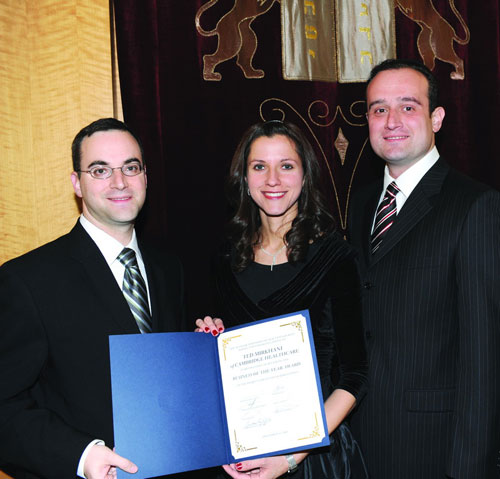.jpg)
Englewood—“When one leaves behind family, friends and associates who perpetuate his values, that person will always be amongst us,” said Rabbi Yossie Stern, executive director of Project Ezrah. This description was one of many heartfelt tributes poured out this week as people heard of the passing of Ted Mirkhani, z”l.
Mirkhani, 40, may have looked to those who didn’t know him to be merely a successful businessman and an owner of multiple nursing homes. But what he truly was known for is perpetuating extraordinary acts of chesed in both the public and private spheres and for also taking it upon himself to enact the highest form of chesed, giving people the means by which to earn their own parnassah.
Working on behalf of others came early in Mirkhani’s life. “As a pre-teen student at Thomas Jefferson Middle School, Ted volunteered at the Teaneck Nursing Home,” said Stern. “Feeding the residents, reading to them, and helping them pass the time with conversation gave his commitment a focus; he knew that his future vocation and avocation would be in giving chizuk and caring for people,” he said.
Mirkhani’s first job was at that nursing home, making beds, for the small fortune of $3.35 an hour. He continued to work at nursing homes throughout high school, college and graduate school and then became the youngest health care administrator in the State of New Jersey.
Eleven years ago, when Mirkhani was just 29 and already comfortable with his finances, he joined with Project Ezrah to develop a nine-month training program to help people either in great need of parnassah, job retraining, or a meaningful career, to do what he did, to become nursing home administrators.
Project Ezrah, founded in 2001, is a not-for-profit 501(c)3 organization, offering a variety of employment as well as financial and non-financial support-related services to members of the community.
“The nursing home administrator program was created under Ted’s auspices, his way: With quality of care and tutorial substance and with respect for each intern,” said Stern. “Ted felt strongly that no intern be forced into a bind while working toward certification, and instituted a stipend, increasing as the program progressed. Additionally, health insurance coverage was arranged on an as-needed basis,” he said.
To date, over 100 candidates have graduated from this unique program. “It is in Ted Mirkhani’s zechus and is his professional reward that these men and women have gone on to successful and fulfilling careers in the industry,” said Stern.
“There are so many people who benefited from knowing him, who are better, deeper, more capable, more self-sufficient people because he was a part of our lives,” said a close associate of Mirkhani’s, Rabbi Daniel Feldman, spiritual leader of Congregation Ohr Saadya of Teaneck and a Rosh Yeshiva at Yeshiva University.
“If, inspired by Ted’s example, we are more sensitive to others, we are more generous and compassionate, we are wiser in our dealings, we are deeper and stronger in our faith, we will be repaying Ted in small measure for what he has given to us, and we will ensure that his soul shall be ever bound in the bind of life,” said Feldman.
How does one learn how to do chesed in the way that Mirkhani did? By understanding how he did chesed, who he did it for, and with the same level of commitment multiple times over. “There is no “cap” to chesed,” said Stern. “Therefore, our commitment to give continues and does not change after one gives the first, second or even third time,” he said.
Rabbi Shalom Baum, spiritual leader at the Mirkanis’ shul, Congregation Keter Torah, in Teaneck, shared a story at the levaya that illustrates this lesson perfectly. Mirkhani used to attend the 7:00 AM minyan at the shul, and would regularly give money to a man there. “When I visited Ted at home when he was already ill, he was no longer able to go to that minyan,” Baum said. “He handed me a sum of money, and asked me to give it to this person. But, he also told me the man’s shoe size and coat size, asking me to help him replace his clothing if it was necessary. Ted not only knew the name of this man, which I didn’t even know, but he also knew his shoe and coat size and what to do with that information,” he said.
Mirkhani is survived by his wife Shira, sons Noam Elimelech, Dov Zev, Yonatan Lev and the Mirkhani and Silberstein families. Donations in Ted Mirkhani’s memory can be sent to Project Ezrah (http://www.ezrah.org/donate.shtml) and the Mir Yeshiva (1791 Ocean Pkwy, Brooklyn, NY 11223).
By Elizabeth Kratz













